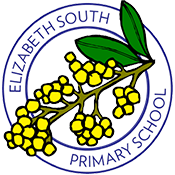Speech and Language Interventions
At Elizabeth South Primary School we offer additional speech pathology support through a student speech pathology clinic. The school funds a senior speech pathologist to plan and supervise groups of 4 student speech pathologist to provide intervention. The speech pathology team are on site Wednesdays and Thursdays throughout the school year.
All Reception students' speech and language skills are screened at the beginning of the year to identify students who would benefit from additional speech pathology support in their Reception year. Prioritised students may receive small group language interventions using a book-based approach, short individual support in literacy rotations, or a speech session at least twice per week. A small number of students are offered an individual session each week targeting their individual speech and language needs. In all programs, goals for support are set, monitored and adjusted as the student progresses.
Students across all year levels who are experiencing significant communication difficulties may be referred to Student Support Services for review by the speech pathologist. The speech pathologist works with your child's teacher to support the student's communication development in the classroom and may recommend the student speech pathology clinic or speech SSO if spaces are available.




